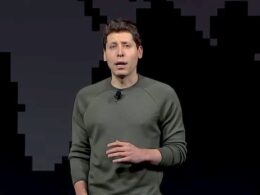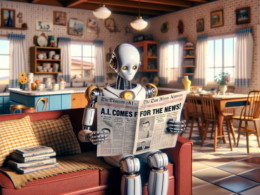The drama at OpenAI might have quieted down by Tuesday, but the situation remains unresolved with key players continuing their strategic moves. Former OpenAI CEO Sam Altman is actively negotiating his return with the board of directors, including Adam D’Angelo, Quora’s CEO and a current board member. Additionally, interim CEO Emmett Shear reportedly threatens to quit if the board doesn’t clarify their reasons behind Altman’s dismissal.
A Dramatic Shift in Leadership
OpenAI’s leadership faced a dramatic shift on Friday with the sudden termination of CEO Sam Altman over accusations of not being “consistently candid.” While the board has remained mostly silent since the announcement, OpenAI’s chief scientist, Ilya Sutskever, expressed regret over his role in Altman’s dismissal via a tweet on Monday. Also removed from the board was president Greg Brockman. This unexpected move sparked intense speculation about Altman’s alleged secrets and how he would respond. Sources claimed powerful figures were lobbying for his return and employees threatened to quit without their favored leader.
The Uncertain Future of Sam Altman
Despite Friday’s unceremonious ouster as OpenAI’s CEO, Altman may yet make a comeback. Influential supporters like Microsoft’s Satya Nadella reportedly intervened on Altman’s behalf, eventually offering roles to every OpenAI employee unsatisfied with the board’s decision. With many employees allegedly threatening to quit without Altman, speculation swirled about whether this AI luminary would launch a rival venture or be reinstated within days. His future remains uncertain after this boardroom coup rocked the tech world.
By Tuesday morning, the legal consequences of the board’s actions came into focus. OpenAI’s sudden ouster of Altman has sparked outrage among some investors, with sources telling Reuters that stakeholders are exploring legal options against the board. This bombshell move put the future of the red-hot AI startup in jeopardy, jeopardizing the massive investments made into what was seen as a crown jewel in the generative AI sector, according to the Reuters report. With most of OpenAI’s 700+ employees threatening mass resignation without Altman, investors worry they could lose hundreds of millions sunk into the company, Reuters said.
However, their recourse may be limited given OpenAI’s unique corporate structure, where the nonprofit parent organization holds ultimate control instead of investors. Experts told Reuters that investors have a weak legal case since companies have broad latitude in business decisions. Additionally, obligations for nonprofit boards are more flexible than for-profit ones. While firing a visionary founder seems shocking, it has precedent in cases like Apple ejecting Steve Jobs, according to the Reuters story. Ultimately, OpenAI’s insulation from investors via its nonprofit parent may prove to be ”a feature, not a bug,” according to Reuters. It allowed the organization to maintain its core mission and oversight. The leadership shakeup has certainly caused an uproar, but investors may have little power to change the outcome, the Reuters piece suggested.
Potential Legal Ramifications
Additional questions swirl around the previous legal actions taken against OpenAI from various authors of copyrighted materials used to train the foundation models developed by the company. Earlier this year, OpenAI filed motions to dismiss most claims in two copyright lawsuits brought by authors and comedian Sarah Silverman. The AI research company behind ChatGPT argued its large language models were transformative technologies, though plaintiffs disagreed. In its filings, OpenAI contested nearly all copyright infringement counts, touting ChatGPT’s potential. (Update: As of Tuesday, new class-action legal challenge was filed against both OpenAI and Microsoft in the Southern District of New York, alleging copyright breaches of works by non-fiction authors.)
The lawsuits involving OpenAI could also be affected if the company collapses. However, the nonprofit parent organization’s ultimate control and the broad latitude companies have in firing founders provide strong defenses. With OpenAI’s future uncertain, the extent of liability depends on how events unfold and specific resulting harms. For now, the legal state of play is ambiguous.
Beyond offers from Microsoft, OpenAI employees had public offers for equivalent roles at other high-profile tech companies. In a tweet on Monday, Marc Benioff, CEO of Salesforce, said that the company would “match any OpenAI researcher who has tendered their resignation full cash & equity OTE to immediately join our Salesforce Einstein Trusted AI research team under Silvio Savarese.” Benioff issued his offer at several OpenAI directly in replies, but there was some skepticism from his audience.
Another potential issue facing OpenAI employees looking to exit with Altman is their immigration status. To address that, Benioff ensured that Salesforce would maintain any employees working under the H1B speciality occupation visa. Microsoft CEO Satya Nadella, in recent interviews with CNBC and Bloomberg Monday night, left the future of OpenAI’s leadership and potential staff migration to Microsoft open-ended, stating it was a decision for OpenAI’s board and employees. He expressed openness to both retaining partnership with OpenAI or welcoming its employees to Microsoft. However, he emphasized the need for governance changes at OpenAI, highlighting the importance of transparency and communication to avoid surprises. When asked about the identity of OpenAI’s CEO, he humorously deferred the question back to OpenAI and its board.










